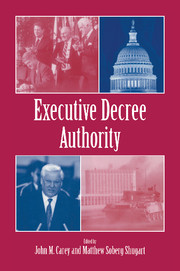Book contents
- Frontmatter
- Contents
- List of Contributors
- Preface
- 1 Calling Out the Tanks or Filling Out the Forms?
- Part I From Delegated to Constitutional Decree Authority
- 2 When the President Governs Alone: The Decretazo in Argentina, 1989–93
- 3 Presidential Decree Authority in Russia, 1991–95
- 4 Presidential Usurpation or Congressional Preference? The Evolution of Executive Decree Authority in Peru
- 5 Presidential Decree Authority in Venezuela
- Part II Constitutional Decree Authority and Conflict Between the Branches
- Part III Absence of Conflict Over Decree
- Appendix of Constitutional Provisions Regarding Decree
- References
- Index
3 - Presidential Decree Authority in Russia, 1991–95
Published online by Cambridge University Press: 18 December 2009
- Frontmatter
- Contents
- List of Contributors
- Preface
- 1 Calling Out the Tanks or Filling Out the Forms?
- Part I From Delegated to Constitutional Decree Authority
- 2 When the President Governs Alone: The Decretazo in Argentina, 1989–93
- 3 Presidential Decree Authority in Russia, 1991–95
- 4 Presidential Usurpation or Congressional Preference? The Evolution of Executive Decree Authority in Peru
- 5 Presidential Decree Authority in Venezuela
- Part II Constitutional Decree Authority and Conflict Between the Branches
- Part III Absence of Conflict Over Decree
- Appendix of Constitutional Provisions Regarding Decree
- References
- Index
Summary
INTRODUCTION
Since the introduction of an independently elected president in Russia in May 1991, presidential decrees have played a central role in the political development of the country. Under both constitutions in effect since the collapse of the Soviet Union, the president has been granted significant Constitutional Decree Authority (CDA), and in the First Russian Republic (1991–93), the assembly delegated sweeping powers to President Boris Yeltsin. The nature and extent of presidential decree authority and the political and institutional context in which it was exercised, however, varied considerably between the two post–Soviet Russian republics. Russia thus provides valuable opportunities for examining the origins and the exercise of both constitutional and delegated presidential decree authority.
The role of presidential decrees in the development of Russian democracy has been highly controversial. President Yeltsin's use of decrees has often been termed “autocratic” (Wishnevsky 1992, 1993b), although some Western analysts have seen Russia as a paradigmatic case of “delegative democracy,” in which the president rules by decree and thus usurps or at least marginalizes the powers and function of the assembly (Kubicek 1994; Linz 1994; O'Donnell 1994; Roeder 1994). Such a democracy, these critics hold, is less representative of the popular will than one in which an assembly plays a major role, and it is also more prone to breakdown. Russia, they argue, because of its staggering geographic, economic, cultural, and religious diversity, is particularly ill-suited for this form of rule, which may undermine Russia's nascent democratic institutions.
- Type
- Chapter
- Information
- Executive Decree Authority , pp. 62 - 103Publisher: Cambridge University PressPrint publication year: 1998
- 12
- Cited by



